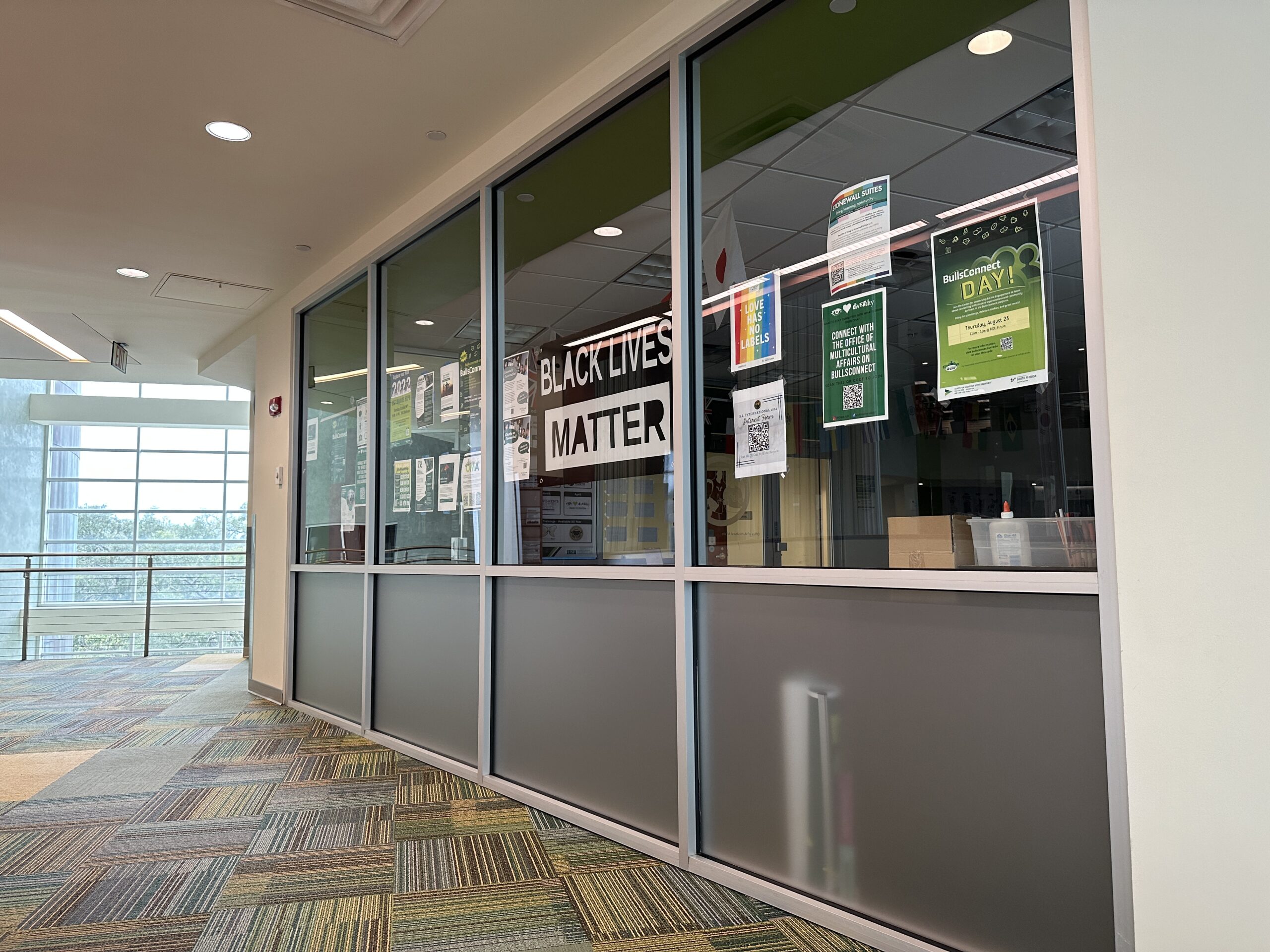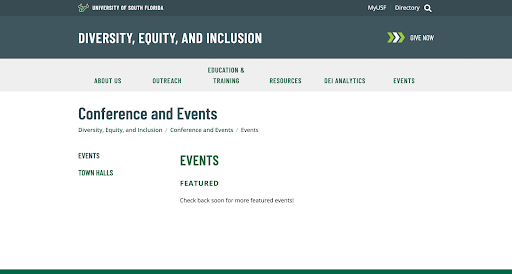DEI’s future at USF: The question on everyone’s mind

At the University of North Florida, a statewide ban on diversity, equity and inclusion (DEI) funding led to the closing of the campus’ diversity office along with its interfaith, intercultural, women’s and LGBTQ+ centers on Jan. 24.
But at USF, the future of DEI initiatives remains a largely unanswered question.
On Jan. 24, the Board of Governors (BOG) gave final approval on a regulation to prohibitions against using state and federal funds on diversity initiatives at Florida’s public universities.
Edelyn Verona is a USF professor and co-director of the Center for Justice Research and Policy. Verona said those who are involved in DEI work have been left in a state of “limbo.”
“Those folks are constantly wondering ‘Is this alright for me to do?’” she said. “‘Can I continue to do the work that I was hired to do?’ And it’s hard to feel that way.”
USF is reviewing the regulation to determine its impact, USF spokesperson Althea Johnson said. Once the review process is done, Johnson said the university will provide guidance on its implementation.
The regulation, passed by state officials last month, defines DEI as campus programs, activities or policies that “classify individuals on the basis of race, color, sex, national origin, gender identity or sexual orientation” and promotes differential treatment based on the classifications.
Related: USF replaced sociology as a gen ed requirement. What does that mean for students?
The Oracle reached out to 18 professors for interviews regarding the impact of the regulation. Most did not answer the request for comment or declined an interview.
Though Verona said the lack of guidance from USF is frustrating, she understands the university’s “wait and see” attitude.
“If we make too much noise about it, then the focus comes on us and then the state may come down on us a little harder,” she said. “Working behind the scenes may be the way to best address and keep some of what we believe is important.”
Diversity and Inclusion Office at USF
The future of USF’s own Diversity and Inclusion Office remains unclear.
Among its roles, the office plans and implements “comprehensive institutional” university-wide DEI programs, according to its mission statement. The office promotes a “university culture” supporting inclusivity and eliminating “institutional bias.”
The office’s website lists no upcoming events for this semester. There is also no information on staff for the office on the website.

In 2022, USF reported the most DEI spending out of the state’s 12 public institutions totaling $8.7 million, according to an audit requested by Gov. Ron DeSantis. State funds accounted for $2.5 million of that funding.
The funds were used for multiple different programs and classes, with the largest portion – $1.1 million – going to the Office of Diversity and Inclusion. Most of that money was funded by the state.
On Jan. 31, 2023, DeSantis also announced a plan to eliminate DEI funding and critical race theory initiatives. A week later on Feb. 7, USF halted the search for a new vice president for DEI.
“Given the uncertainty surrounding any laws or regulations that may eventually come from these requests and proposals, there are too many unknowns to proceed with our current search,” President Rhea Law wrote at the time.
Richard Manning, secretary of the Faculty Senate, said the legislature, BOG and Board of Trustees (BOT) believe “we are living in a post-racist, post-racial world or want to pretend that we are.”
“The first is just ignorant,” he said. “The second is self-serving and nasty.”
Jenifer Jasinki Schneider, president of the Faculty Senate and BOT member, said USF is still waiting on legal guidance and declined to comment.
Courses
Arson Werre, a junior majoring in gender and sexuality studies, said they are concerned with the possible removal of classes or curriculum at USF.
Werre said the possibility of classes being removed has contributed to a “certain air of suspense and dread” over the women’s and gender studies department.
“There’s a lot of fear over how we’re going to be impacted and what this says about the future of America and Florida in particular,” Werre said.
In the 2022 audit, the university reported a combined DEI spending of $910,000 on academic courses – all of which was state-funded.
The courses included “Introduction to the Black Experience,” “Racism in American Society,” “Racial and Ethnic Relations,” “Literature Race and Ethnicity” and “Internship in Women and Gender’s Studies.”
Classroom instruction, however, will not be considered as a “campus program and activity” under the regulation, said Gerard Solis, from the Office of General Counsel, at Wednesday’s Faculty Senate meeting.
“When they talk about academic programs being a campus program or activity, they’re not talking about what faculty do in the classroom… not classroom instruction,” Solis said.
Office of Multicultural Affairs
The Office of Multicultural Affairs (OMA) at USF is funded by students’ activity and service (A&S) fees. This fee is paid by Tampa students every semester and is used to fund student government and student organizations.
A university spokesperson confirmed in an email to The Oracle that A&S fees are exempt from the regulation.
But there are changes coming to the office. Paid staff at OMA will no longer play a direct role scheduling cultural events and heritage month programming, according to Winston Jones, associate dean of students who is acting director at OMA.
There are four positions listed as vacant in OMA’s website, including assistant director for programming, student programs coordinator and assistant director for training and education.
Related: How USF is celebrating Black Heritage Month – The Oracle
Jones said OMA is implementing a Student Activities Board, which would function as a student organization, that will plan the events. Paid staff will serve as advisers and administrative support to the board.
In 2022, USF reported $844,000 of DEI spending going towards OMA. State funds accounted for $50,750 of the office’s funding.
Student organizations
The regulation will not apply to student organizations as clarified by members at the Jan. 24 BOG meeting.
“Now, there may be other reasons that people might want to oppose [the regulation],” board member Alan Levine said. “But, it was said that we were banning student organizations and that’s just not a fair statement.”
Tennisha Padmore, a member of Minorities in Pre-Law (MPL), said the university’s silence on the regulation accentuates her fears regarding the policy’s repercussions.
“We won’t know what’s going to happen until it happens,” she said. “Then after it happens, we really can’t change it. I’m scared that the damage that will be done will be irreversible.”
Padmore said she isn’t concerned with the regulation’s direct impact on student organizations’ funding. However, she is afraid it will lead to a decrease in diversity at USF.
She said it could lead to a decline in membership or even the “disappearance” of MPL or other multicultural organizations.
“If [USF] still has a diverse student body, they won’t have anywhere that they can call home,” she said. “They won’t be able to meet people that are just like them. So, that scares me… they won’t have the college experience that we’re currently having.”








